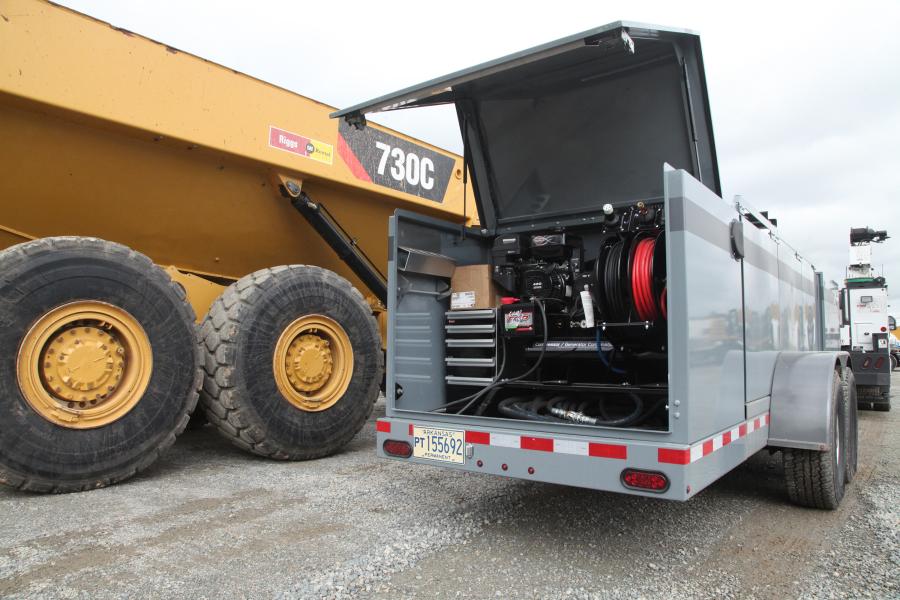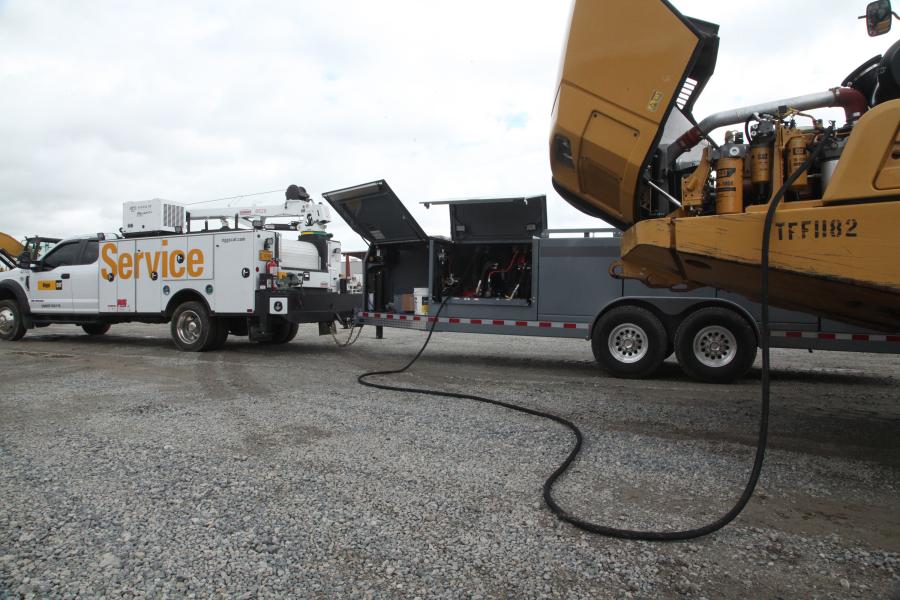The service and lube trailer from Thunder Creek has allowed Riggs Cat to rely less on more expensive lube trucks.
For Robert Frye, digital services manager at Riggs Cat, reducing cost is the greatest challenge for both him and his customers.
“The biggest challenges that we face are trying to cut our costs so that we can compete with competitors constantly dropping their price for the service.”
Frye's field teams service heavy construction equipment and backup/auxiliary power generation installments throughout the state of Arkansas — it's hard to cut costs in any tangible way that doesn't affect the quality of the service provided. Riggs Cat, however, has reduced the overhead costs of its field service work by implementing service and lube trailers (SLT) from Thunder Creek Equipment — outfitted with the same fresh fluid, waste fluid and service capabilities as much larger, more expensive lube trucks.
“We currently have four of these trailers… three for our equipment field lube, and one for power lube for generator and engine service in the transportation and energy [industries]. We have them placed throughout the state. It's allowed us to reduce some of our overhead costs associated with the larger lube trucks… to allow us to price ourselves more efficiently for the customer,” Frye said.
“Being able to buy a F-350 to pull this, compared to having to buy [a larger lube] truck with the box on the back. You can almost set up two [pickup] trucks and trailers for what it cost for one lube truck, so that's just been a good change for us. It's allowed us to service our customers quicker, we can get to more places, and get more work done.”
Anatomy of a Service and Lube Trailer

The SLT deployed by Riggs features a modular tank design capable of holding fluids in tanks with combinations of 25, 55 and 110 gallons. This can include tanks for diesel fuel, oil delivery (engine or hydraulic), used oil reclamation, grease delivery, antifreeze, DEF and other fluids based on field maintenance needs. In addition to fluid delivery, the SLT is outfitted with a combination generator/air compressor. This helps power the pneumatic pumps for fluid delivery and other jobsite tools needed for field maintenance.
The three Riggs construction equipment service trailers are outfitted with multiple tanks for different oils — 10, 30- and 40-weight. “And then, we've got the waste tanks as well for the different oils. We've got 100 gallons of engine oil on those, and then we've got 55 gallons each of transmission and hydraulic oils. We [have] the generator and compressor on those, and we've also got the grease lube system on it.”
Riggs' fourth SLT trailer, used for onsite power generation service, is set up with a bulk tank of 40-weight engine oil, with separate 55-gallon waste oil tanks, and tanks for clean coolant and waste coolant.
“It is an 880 [gallon] total, so we have 440 clean and 440 for waste disposal. On the back of this, we have a generator/compressor combo, so we can have power and air for our tooling, when we're on the job. This can be a stand-alone unit. We just take this out to the job, and all of our field trucks can hook up to it and pull it.”
Advantages Over Lube Trucks, Stand-alone Pickups

“We found that we can operate more efficiently and can reduce cost to our customers with these trailers,” said Frye. “We can get pickup trucks up and down the road a lot cheaper than the larger lube trucks. If they've got to get parts or something last minute, they can park the trailer and they can take their truck. You can get in and out of places easier. When you're in the big lube truck, it's hard to go anywhere. You've got to worry about how high it is and weight limits. You've got scales and DOT. You fight all that stuff. We've taken a lot of that out by having the lube trailers.”
Frye said the trailers offer an advantage for travel and fitting into tight spaces.
“Location can be a big deal. If we're traveling further, a lot of times if we can make do with the trailer we'll send it because it's cheaper to travel. It may depend on where their job site is. Is it a customer where we have limited space and we may not be able to fit the lube truck? We can back the trailer in, park it, and move our truck and then go to work.”
Large lube trucks also typically require a driver with a CDL and a HAZMAT endorsement. Frye explained that with a CDL, requirement, “You're limited on the hours they can drive and [the driver is] quite expensive. You can't really charge enough to drive it to a job site and have a customer want to pay for the service. It's really hard to recover any costs of the truck itself, so it makes it harder to do business. So being able to hire guys that can drive a pick-up truck to pull the trailers has really helped us. It allows us to increase profit on the back end by reducing our cost initially.”
In the past, Riggs also would service select job sites out of the back of a pickup truck simply using smaller bulk containers and jugs. The trailers have helped them speed up service in those applications, and ultimately take on more work.
“I feel like it's helping us get jobs done faster than even I expected. I would say, depending on the job, we've probably eliminated 15 percent or so of the time it takes compared to doing it out of the back of a pickup. It means that we can add more jobs in a day. More jobs in a week. The more jobs we get done, the more customers we can service, then that's just more money that we make. The goal is to grow and get bigger and you can't do that without adding customers and getting the work done.”
A New Service Model
Frye is convinced SLT trailers help reduce costs, and he can pass those savings to his customers, giving him a competitive advantage. While Riggs still plans on keeping a few lube trucks in its fleet, the company sees an expanded opportunity for the trailers in the future based on their ability to lower upfront costs without sacrificing service or performance.
“They've definitely helped us. We hope to grow to the point that we will be adding more trailers to the fleet throughout the state, just to the point of having a trailer close by where we can get to more customers. The support on them is great. Great warranty. Great service from Thunder Creek to take care of any issues we've had. I just look forward to running these trailers for years to come.”
(Cole Walker is territory sales manager of Thunder Creek Equipment)
This story also appears on Truck and Trailer Guide.
Today's top stories

















